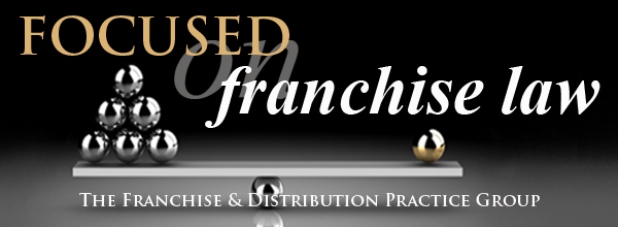Forum Selection & Automatic Termination Clauses

bkurtz@lewitthackman.com
tgrinblat@lewitthackman.com
msoroky@lewitthackman.com
kwallman@lewitthackman.com
March 2015
Barry Kurtz & Bryan H. Clements’ Article in Business Law News, a publication of the State Bar of California
“The fact that states generally require brewers to provide distributors with exclusive territories in which no competitors may distribute the brewer’s beer demonstrates the degree to which beer distributors enjoy greater territorial protections than do franchisees…”
Click to read: Traditional Franchise and Beer Distribution Relationships: A Legal Comparison
Samuel C. Wolf Article in Valley Lawyer, a publication of the San Fernando Valley Bar Association
“Franchise lawsuits and most business litigation are usually economic in nature, and application of the economic loss rule will often narrow the scope of the claims and damages available as a remedy…”
Read: Using the Economic Loss Rule to Your Client’s Benefit
FRANCHISOR 101:
Forum Selection Clause Held Enforceable

 A federal court in Sacramento recently upheld a franchisor’s forum selection clause and transferred an action brought by an area representative to the federal district court in the Western District of Texas.
A federal court in Sacramento recently upheld a franchisor’s forum selection clause and transferred an action brought by an area representative to the federal district court in the Western District of Texas.
HDYR operated a sushi restaurant in Austin, and sought to franchise the concept under the name How Do You Roll? HDYR entered into an area representative service agreement with the plaintiffs under which the plaintiffs were to solicit franchisees to purchase How Do You Roll? restaurants in Northern California.
The agreement contained a forum selection clause providing for exclusive venue for disputes in the state or federal district courts in Texas.
In the Ninth Circuit, a forum selection clause is generally considered unenforceable only if it was the result of fraud, undue influence, or overwhelming bargaining power; if the selected forum was so inconvenient that forcing the plaintiffs to litigate there would essentially deny them their day in court; or if enforcement would contravene a strong public policy in the forum where the suit was brought.
The court found that the plaintiffs presented no evidence that would void the forum selection clause. The court was not persuaded by the area representative’s argument premised on the California Franchise Relations Act’s (CFRA’s) strong public policy against enforcing out-of-state forum selection clauses in franchise agreements, because the area representative agreement was not a franchise agreement. The court found that the area representative was retained to recruit franchisees, but was not a franchisee itself and was not the type of party that the CFRA was designed to protect.
The HDYR ruling is encouraging for franchisors since it illustrates the value of including well-conceived and well-drafted forum selection clauses in area representative agreements.
See: Estep v. Yuen Yung.
FRANCHISEE 101:
Nice Try Mr. Franchisee
In Fantastic Sam’s Salons, Corp. v. Moassesfar, a federal court in Los Angeles denied a motion by former franchisees to dismiss Fantastic Sam’s claims for breach of contract and trademark infringement based on the contractual limitations period in the parties’ franchise agreements.

The franchisees were required to pay a weekly franchise fee so long as the franchisee used the franchisor’s system or marks, whether authorized or not. The franchise agreement stated the agreements terminated automatically, without notice from the franchisor, if the franchisees’ bank failed or refused to honor any authorized bank draft for the payment of any weekly fees for two consecutive weeks.
The franchisees’ checks to the franchisor were dishonored, first in January 2011 and again in February 2012. However, the franchisees continued to operate both locations as Fantastic Sam’s salons until October 2014, when a stipulation to terminate the franchise agreements was entered into in the franchisor’s termination action filed in August 2014.
The Moassesfars argued that the agreement had automatically terminated when two consecutive payments were missed, thus barring the franchisor’s claims. The court rejected this theory, noting that the automatic termination clause without notice was contrary to California law and that the requirement of notice and an opportunity to cure prior to termination was intended to protect franchisees against arbitrary terminations.
See: Fantastic Sam’s Salon Corp. v. Moassesfar.
